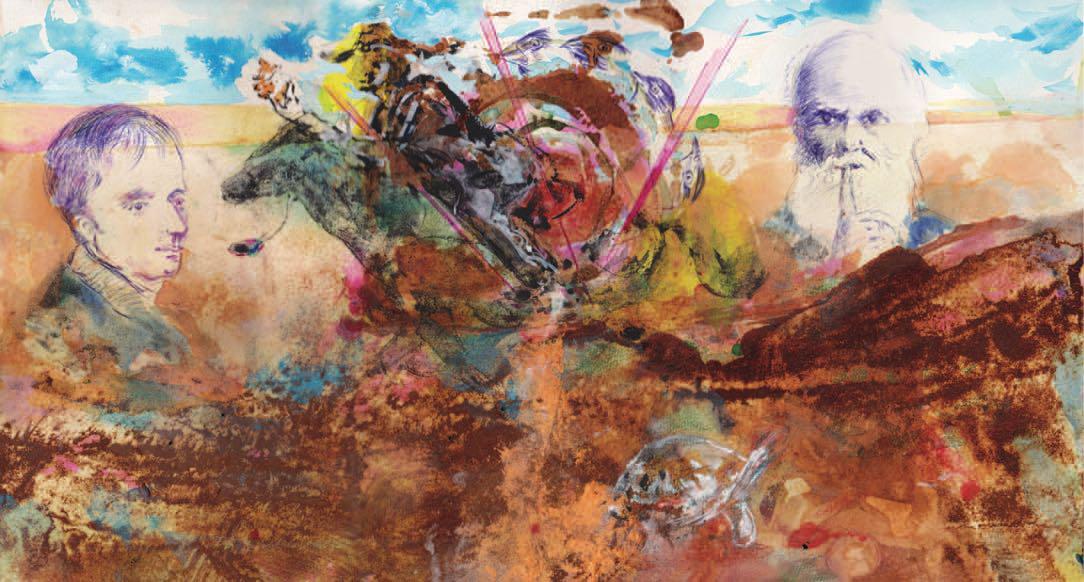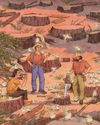Prøve GULL - Gratis
Wordsworth & Darwin
Philosophy Now
|February/March 2024
Christine Avery wonders whether poetry can help us to deal with science.

In his poetic autobiography The Prelude (1799), William Wordsworth describes a dream in which he saw an Arab horseman riding by at desperate speed carrying a stone and a shell. The stone represented reason and science, while the shell stood for poetry and prophecy. Both were seen to be in urgent danger, and it's clear that Wordsworth attributed equal and supreme value to both of them.
Whether the danger to these values has increased or diminished since Wordsworth's time (1770-1850) would be hard to estimate, but it seems clear that reason and science have steadily gained prestige at the expense of poetry and imagination. This has only been strengthened by the forces of positivism and reductionism, with their battering formula of 'this is only that'. According to reductionism, biology in the end boils down to chemistry, and chemistry to physics, and the implication drawn might be that poetry boils down to biology. But the battle is far from over.
In her excellent 2009 book Darwin's Plots: Evolutionary Narrative in Darwin, George Eliot and 19th Century Fiction, Gillian Beer contrasts the disciples of reason with more imaginative creators. Beer lays out Sigmund Freud's claim that “the universal narcissism of men, their self-love, has up to the present suffered three severe blows from the researches of science” (originally from ‘A Difficulty in the Path of Psycho-Analysis’, 1953). These blows are, in chronological order: the Copernican revolution displacing the Earth from the centre of the universe; the Darwinian argument that ‘man is not a being different from animals or superior to them’; and, thirdly, Freud's own demonstration that ‘the ego is not master in its own house’ since we often act with unconscious motivation. These ‘blows’ to humanity's sense of specialness, are connected as successive steps forward of the rational mind.
Denne historien er fra February/March 2024-utgaven av Philosophy Now.
Abonner på Magzter GOLD for å få tilgang til tusenvis av kuraterte premiumhistorier og over 9000 magasiner og aviser.
Allerede abonnent? Logg på
FLERE HISTORIER FRA Philosophy Now

Philosophy Now
Books
Lucy Weir takes a wheel of healing for an intellectual spin, Frederik Kaufman examines a theory of the origins of equality, and Frank S. Robinson doubts a holistic vision of life, the universe, and everything.
14 mins
October/November 2025

Philosophy Now
Moral Decision-Making for a Job Search
Norman Schultz wonders when working is wrong.
14 mins
October/November 2025

Philosophy Now
The Mediation of Touch
A conversation between Emma Jones and Luce Irigaray.
15 mins
October/November 2025

Philosophy Now
Edward Gibbon (1737-1794)
John P. Irish considers some principles of history through the history of a historian.
11 mins
October/November 2025

Philosophy Now
Karl Sigmund
is an emeritus professor of mathematics at the University of Vienna. He has made major contributions to evolutionary game theory and to the history of the Vienna Circle, who met regularly in Vienna from 1924-1936. Katharine Mullen talks with him about mathematics, and about the Vienna Circle.
5 mins
October/November 2025

Philosophy Now
Can Al Teach Our Grandmothers To Suck Eggs?
Louis Tempany wonders whether the problem is with the machines or with us.
7 mins
October/November 2025

Philosophy Now
Revisiting the Ontological Argument
Raymond Tallis contends that a definition of God cannot necessitate God's existence.
7 mins
October/November 2025

Philosophy Now
What My Sister Taught Me About Humanity
Lee Clarke argues that we need a more inclusive view of moral personhood.
13 mins
October/November 2025
Philosophy Now
Macmurray on Relationship
Jeanne Warren presents aspects of John Macmurray's philosophy of the personal.
4 mins
October/November 2025

Philosophy Now
Forced Vaccination
Naina Krishnamurthy asks if it's ethical or egregious.
8 mins
October/November 2025
Listen
Translate
Change font size

